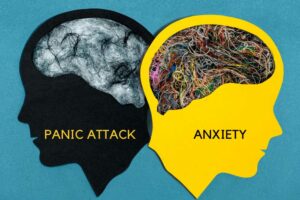It was a beautiful afternoon in springtime. The track-and-field team was practicing. A history professor was walking within earshot of the track, talking with a student. On the track, the sprinters got in the starting blocks. The starting pistol fired, and the professor dropped to the ground.
Years after his service in the armed forces, the sound of a pistol still caused him to drop and seek cover. This hypervigilance is the effect of trauma.
Trauma, however, isn’t limited to wartime experience. Trauma is highly subjective and can stem from events like the unexpected loss of a spouse, abuse (physical, sexual, or emotional), bullying, violent crime, a car accident, or a serious illness. This trauma can develop into Post Traumatic Stress Disorder (PTSD), the symptoms of which can include: flashbacks, nightmares, depression, anxiety, shame, anger, dissociative symptoms, irritability, hypervigilance, relationship issues, and insomnia.
If Trauma Is the Cause, Addiction Is a Symptom
A significant number of people who have experienced a traumatic event turn to alcohol or drugs to relieve the painful emotions and manifestations of trauma. Some mental health professionals believe that trauma is one of the root causes of substance use disorder.
According to the International Society for Traumatic Stress Studies (ISTSS), up to 75% of people who have survived trauma as the result of abuse or violence report problems with alcohol. Up to one-third of people who have experienced trauma as the result of an accident, illness, or disaster report that they have developed alcohol problems. Nearly 80% of Vietnam veterans who seek treatment for PTSD also have alcohol use disorder. Women who have experienced traumatic life events are at an increased risk for alcohol use disorder. And adolescents who have been sexually assaulted are more than four times more likely to abuse alcohol, four times more likely to abuse marijuana, and nine times more apt to abuse hard drugs.
While the drug or alcohol use does provide a distraction from trauma, it is only temporary. Ironically, the alcohol or drug abuse creates more of the symptoms that the person was trying to mask.
Healing From Trauma
If trauma is the cause and addiction is the symptom, then the trauma must be addressed if the patient is to truly heal from his or her addiction. Both need to be treated, and treatment must be coordinated and integrated.
Although professional care is usually necessary to recover from trauma, self-care measures can be beneficial as well. According to the article “Emotional and Psychological Trauma” on helpguide.org, there are four primary self-help areas that can be very helpful to your recovery from trauma.
Exercise for at least 30 minutes a day. If you concentrate on the sensations in your body while exercising, your workout session also becomes an exercise in mindfulness.
Spend time with other people. If you want to discuss your traumatic experience, fine, but simply being with people helps. Join a support group for trauma survivors. Volunteer in your community. Connect with old friends or make new ones.
Regulate your nervous system. Practice mindful breathing. Just the act of focusing your attention on your breathing can help you feel calmer and stay grounded. A simple technique for this is to sit in a chair, placing both feet firmly on the ground and your back up against the back of the chair. Look around you and find six objects in your environment to observe. Perhaps you find six green items. This simple act can bring you a measure of calm. Also, allow yourself to feel what you feel when you feel it. If you are in a place where you can’t do this, mentally “bookmark” the feeling, and come back to it later in the day.
Take care of your health. Make sure you get enough sleep, that you eat a well-balanced diet, and that you avoid drugs and alcohol.
Work with a professional. You may find that working with a mental health professional can help you work through the trauma. Make sure you find a therapist who has experience with trauma and who you feel comfortable with. You may have to have an initial consultation with a few therapists before you find the right fit for you.
Although treatment for trauma will vary depending on your needs and the therapist’s training and recommendations, there are several types of therapy that are helpful in working through trauma. Cognitive Behavioral Therapy (CBT) can help you to process your feelings and to evaluate your thoughts and feelings. Not everything that we think and feel is accurate, and in CBT you will learn to check your thoughts and feelings against reality.
Your therapist may recommend somatic experiencing. In this technique, your attention is on the sensations that you are having in your body in relation to the trauma, instead of focusing on your thoughts and memories.
Another therapeutic modality that your therapist may use in working with trauma is Eye Movement Desensitization and Reprocessing (EMDR). In this modality, your therapist will combine some of the techniques from CBT with eye movements or some other type of stimulation.
No matter what treatment modality you choose, know that with hard work you can move past your trauma and break free from addiction.
Promising Outlook is a comprehensive drug and alcohol treatment center located in Riverside, California. Promising Outlook provides outpatient care for clients struggling with drug or alcohol addiction. The goal of treatment is to identify and process the trauma that may be the root cause of the addiction, as well as addressing the mental health issues that frequently accompany addiction. Among its treatment modalities, Promising Outlook offers cognitive behavioral therapy (CBT), dialectical behavioral therapy (DBT), mindfulness-based stress reduction, motivational interviewing, and psychotherapy. Promising Outlook is also one of the few treatment centers to offer classes in anger management. A customized treatment plan is developed for each patient based on his or her needs and treatment goals and focuses on treating the whole patient, not just the addiction. Programs are offered for both men and women. If you are struggling with an addiction and are seeking help in a supportive, non-judgemental environment, call 866.980.2869.






